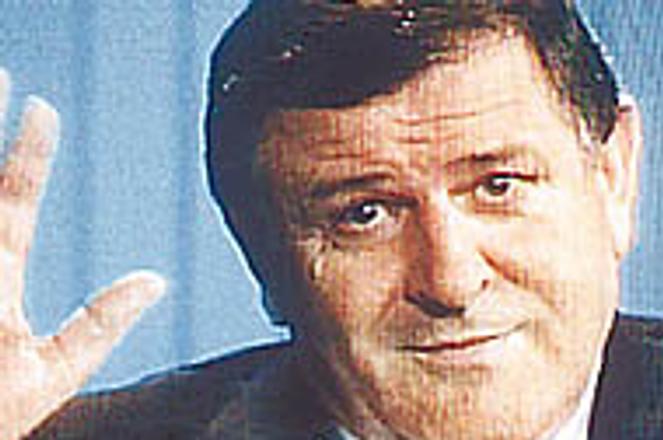On September 30, 1998, Mečiar said good-bye to the electorate in a weekly STV show reserved for the Prime Minister alone called Ako ďalej, pán predseda vlády (What's Next, Mr Prime Minister?). Mečiar sang an old folk song and wept while waving at viewers: "I'm going with God from you, I never hurt any of you..."photo: Spectator archives
State run Slovak Television (STV) has drawn up a written editorial code to ensure that principles of independence and objectivity are adhered to by its reporters, and to protect the station from possible attempts at political manipulation in the lead-up to the autumn 2002 general elections.
To be submitted in September to the nine-member STV Council, which oversees programme balance and objectivity at the public broadcaster, the code is expected to take effect immediately after the council's approval.
STV said the new guidelines had to be adopted to protect the television from "potential attempts by various political or other interest groups to misuse the TV's air space for presentation of their respective interests" - a danger which, said STV spokesperson Milena Rážová, would "grow with the [approach of] the upcoming elections".
The prepared code, which is part of a larger rearrangement of STV's news service, was modelled on the standards applied by the British public TV station, the BBC. It will clarify existing rules for objective reporting and for prioritising news items. Among other things, the code will define the term "publicly important information" and will refer to issues such as accuracy, balance of views within one news item, and not letting journalists express on-air opinions about news items.
Legislators active in media affairs joined media watchdogs in praising STV's initiative, and said they hoped that other Slovak media would follow the example. "Every new, publicly announced rule is a step forward towards objectivity and independence," said Ján Budaj, head of the parliamentary media committee.
"Even the BBC, which has a long history and a reputation for objectivity, has written down the rules because it's not enough to just hope that reporters will be ethical in any situation, not even in a developed democracy as in Britain," he added.
A controversial past
STV's concerns over possible political influence stem from the station's role in the past.
In 1998, when the last parliamentary elections were held, STV "completely failed to live up to its [public-service] obligations by becoming, in effect, an outlet in favour of the then-ruling Movement for a Democratic Slovakia (HZDS), " said Rastislav Kužeľ, head of independent media monitor Memo 98.
While almost all Slovak TV stations have fallen short of sound ethical standards in the past, this was even more acutely apparent in the 1998 pre-election period, when virtually all media divided themselves into two opposing camps, Kužeľ added.
During the previous Vladimír Mečiar-led government, Igor Kubiš was nominated to the post of director by the HZDS. With his help, "preferring the ruling political elite and constantly downplaying the then-political opposition became the norm at STV," Kužeľ said.
His organisation's statistics from two weeks before the September 1998 general elections were uncompromising about the issue of political bias in STV's broadcasts. STV news dedicated almost 65% of air-time to mostly positive coverage of the ruling coalition and the HZDS, while only about 18% was dedicated to the activities of the opposition, these being presented in an either neutral or negative fashion.
The public broadcaster ran editorialised news, and pro-HZDS features such as Poznámka (Note), Komentár týždňa (Commentary of the Week), and a poliktical satire show called Fašírka (Mincemeat) which "continually discredited and downplayed the political opposition", Memo's report issued September 22, 1998 read. It also stated that "a lack of balance, distortion, and misinformation are the norm at STV".
The reputation that STV won at that time still haunts its employees.
"I don't want to comment on the past," said Rážová August 28, adding cautiously: "There were indeed ways to lead this institution non-transparently and in favour of certain political groups."
A clearer future
But with the code expected to be passed this fall, STV should be better armed against any possible repeat of that past. Rážová explained: "These [ethical] principles are being adhered to by our current news staff, but we decided to write these informal rules down.
"There is no guarantee that all [future] STV reporters will, when they arrive here, automatically hold the same [ethical principles] as our current staff. Those who don't identify with our standards should not work for a public broadcaster."
For Rážová, introducing the new set of ethics will also mean a step away from any potential to succumb to other influences, not just political.
"Every day we are confronted with various interest groups who are trying to push through information either to the main news or other STV programmes, by claiming that it's important the public be informed of them. This puts us under immense pressure, and we must have a written definition of what is important to be able to make independent choices," Rážová said.
However, while Kužeľ was supportive of the introduction of the code, calling it a testimony to the fact that Slovak news-making was heading for a "higher ground and greater independence from political influence", the litmus test will come in a year's time.
"The true test of how much it [STV] has developed in guarding against outside influences will come in the pre-election period," he said.


